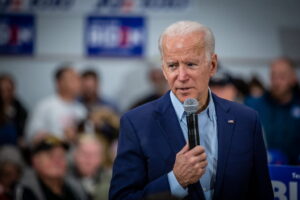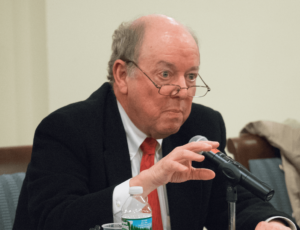Tag: politics
Election of 2020: Iowa Caucuses Begin 2020 Election Season
by The Cowl Editor on February 6, 2020
News

by Maura Campbell ’22
News Staff
Candidates for the upcoming presidential election are making their last-minute campaign pushes as the early primaries begin. The Iowa caucuses to select the Democratic presidential nominee were held on Monday, February 3.
Reporting on the results of these caucuses has caused unusual controversy, as there were inconsistencies with the counting which continued into Tuesday. Current standings, with 71 percent of precincts reporting as of Tuesday afternoon, show Pete Buttigieg leading the polls for the Democratic Party, followed closely by Bernie Sanders.
According to the Iowa Democratic Party, the issue was not caused by any form of hack or intrusion, but rather by a reporting error with a new app used for calculations in the caucuses. Mandy McClure, director of communications for the Iowa Democratic Party, stated on Monday night, “The underlying data and paper trail is sound and will simply take time to further report the results.” Despite the early lack of results, several candidates gave victory-like speeches on Monday night.
Early primaries and caucuses are particularly important for candidates because they often provide an indication of how well a candidate will do in later primaries. Primaries to select the Democratic and Republican nominees for president begin in February and last through June, with the most important voting date being March 3, 2020.
On this day, known as Super Tuesday, the states of Alabama, Arkansas, California, Colorado, Maine, Massachusetts, Minnesota, North Carolina, Oklahoma, Tennessee, Texas, Utah, Vermont, and Virginia all hold their primaries.
Meanwhile, with President Trump’s impeachment trial coming to a close, the American public seems to be largely divided as to whether the Senate should remove Trump from office.
According to an NBC/Wall Street Journal poll released on Sunday, February 2, the majority of Americans do believe that the President is guilty of both articles of impeachment: abuse of power and obstructing Congress. However, public opinion is split along party lines as to whether these actions warrant his removal from office.
This opinion has stayed fairly consistent throughout the course of the trial. This new poll reports that 46 percent of registered voters support removing Trump from office while 49 percent do not; virtually unchanged from the even 48-to-48 percent ratio on the same question reported by NBC/Wall Street Journal’s December poll.
For non-registered voters, it is important to register as soon as possible in order to be able to cast a vote in your state’s primary election. Although many states allow for online voter registration, there are still several states that do not, meaning that registration may have different requirements. For information on how to register or how to vote in your home state with an absentee ballot, call your local town office or visit www.vote.org.
Election of 2020: Impeachment Trial Goes to the Senate
by Kyle Burgess on January 30, 2020
News

by Nicole Silverio ’22
This week, opening arguments began in the Senate regarding the House of Representatives’ impeachment of President Donald Trump. Both Democrats and Republicans have spent the last week making their case of whether r not to remove President Trump. After both sides has the opportunity to ask questions, they will vote on whether or not to subpeona witnesses not yet heard in the investigation.
On December 16, 2019, the House Judiciary Committee released a report explaining the charges against the President. The charges against him are abuse of power and obstruction of Congress. The Democratic Party, led by Speaker Nancy Pelosi, has accused President Trump of obstructing justice for contacting the Ukrainian president to investigate his political rival’s son. In October, the Intelligence, the Oversight and Foreign Affairs committees deposed witnesses involved with Ukrainian foreign policy testifying that Trump wanted the Ukrainian president, Volodymyr Zelensky, to publicly announce investigations into Joe Biden’s son, Hunter Biden and Burisma, a Ukrainian natural gas company that Biden had served on the board of until 2019.
On December 18, 2019, the House of Representatives held a trial in which the representatives held hearings, the Democrats supporting impeachment and the Republicans against it. The final vote was largely along party lines, with all Republicans and three Democrats voting against the impeachment, while the majority of Democrats voted for impeachment, officially impeaching the president.
Speaker Pelosi sent the articles of impeachment to the Senate, where senators have been arguing for or against the president. Pelosi has named seven Democratic members of Congress as the managers who will argue for impeachment. “What is at stake here is the Constitution of the United States” said Pelosi during a press conference. According to Tucker Carlson, host of Fox News’ Tucker Carlson Tonight, Senator Chuck Schumer explained that “even with no chance of removing President Trump at the end of the process, impeachment is still absolutely necessary for this country, and every other problem we face must go on hold to pursue it.”
Senate Majority Leader, Mitch McConnell, is setting rules for the chamber to vote on. Democrats have requested witnesses in the trial, but McConnell has refused this request. Republican senators delayed the vote to subpeona witnesses until after arguments have been made.
President Trump reported that he looks forward to having his due process in the Senate, the majority of which is Republican. Republican Senator Roy Blunt of Missouri told CNN, “Our side has not changed our view on this. I think where House Democrats failed, and maybe Senate Democrats failed, were trying to use the time in a way that would wear us out and deny the president’s team any response this week.” Contrary to the senator’s opinion, CNN editor at large, Chris Cillizza, claims that 1 in 3 Republicans (32 percent) believe Trump has committed illegal acts either before or during his presidency. Despite their beliefs, the majority of them are willing to back Trump, believing he should not be removed from office.
Chairman Jerry Nadler accused Republicans of covering up President Trump’s crimes, claims to which the president’s lawyers, Pat Cipollone and Jay Sekulow, retaliated against. He has been accused by several Republican senators as being “especially partisan.” Adam Schiff, one of the impeachment managers, told CNN that “The President late last night bragged that he had the material. Indeed, they do have the material hidden from the American people. That is nothing to brag about. If the senators are serious about wanting to learn all the facts, if the President’s team wants to contest any of the facts, these documents and witnesses will need to be produced.” Democrats, to the dismay of Republicans, are desperately trying to withhold four Republican votes to obtain evidence and witnesses.
Due to the House Democrats’ vote last month, President Trump must endure the 2020 election through his impeachment, and may run against the political rival who he has had investigated. The question open for debate is whether President Trump’s impeachment will harm him or benefit him this upcoming November 3. The American people will either desire to vote an impeached president out of office, or turn their anger towards the Democrats for bringing the impeachment trials to life to begin with, perhaps believing that the impeachment has turned heads away from the real issues facing our nation. Only time will tell.
Election of 2020: Current Standings for Candidates
by The Cowl Editor on January 16, 2020
News

by Alexandra Huzyk ’20
News Staff
The next United States presidential elections are scheduled to take place on Nov. 3, prompting voters to consider a number of diverse candidates. As of January 2020, there are 12 major Democratic candidates, and three major Republican candidates, including incumbent President Donald Trump.
The eighth, ninth, and tenth Democratic primary debates are scheduled to take place throughout February. These debates help to inform voters, promote accountability of elected officials, and progressively narrow down the number of candidates running for the Democratic nomination. Past debates have pressed candidates to address important issues like healthcare, education, gun violence, inequality, and war. The Democratic primary will likely be settled on Super Tuesday—March 3, 2020—“when the largest number of states and territories hold a presidential preference primary or caucus.”
Front-runners for the Democratic nomination currently include Joe Biden, Bernie Sanders, Pete Buttigieg, Elizabeth Warren, and Amy Klobuchar. Many predict Biden will be the nominee for the Democratic Party; having maintained consistently strong African-American support, continuing to receive a multitude of endorsements, and polling the best against President Trump. According to political Analyst Nate Silver, “Should Joe Biden win Iowa, he has an 80 percent chance of becoming the nominee.”
In the wake of these predictions, Sanders has gained momentum within the past months, receiving $34.5 million in the last fundraising quarter and garnering strong support from younger generations and public sector union members. However, Sanders’ democratic socialist views pose an issue for Democrats who think a more politically moderate candidate has a greater chance of winning against President Trump. In addition, many view Sanders’ age (77) and health as potentially problematic.
In the opposing party, candidates who seek to attain the Republican nomination include incumbent President Donald Trump, Joe Walsh, and William F. Weld. Even after having been recently impeached, for abuse of power and obstruction of Congress, President Donald Trump remains the primary Republican presidential candidate. The chances of either Walsh or Weld being granted this nomination are extremely low.
Although presidential approval ratings of Trump have remained notoriously low throughout his time in office, it is reported that he has around a 40% chance of being reelected to office. These chances of reelection may be explained by the decreasing unemployment rate and increasing GDP growth rates, which some attribute to the work of Trump’s presidency.
Historically, 17 of 44 presidents have been reelected for a second term. On the power of incumbency, Aaron David Miller, an academic at the Carnegie Endowment for International Peace, has said, “As President Trump has demonstrated with frightening clarity, presidents dominate the national and media narratives; we see or hear them daily, in Trump’s case often hourly.”
A number of different factors will continue to influence the likelihood of Trump’s reelection, including the upcoming impeachment trial in the Senate and the recently initiated military conflict with Iran.
Pizza and Politics Series Tackles Midterm Elections
by The Cowl Editor on November 15, 2018
News

by Kellie Johnson ’22
News Staff
On Tuesday, November 13, the political science department joined with the Board of Programmers (BOP) to hold an event in which people could discuss the results of the 2018 midterm elections over everyone’s favorite comfort food—pizza. This was the second Pizza and Politics event held on campus, and it occurred in the Fiondella Great Room in Ruane.
By the start of the event, almost all of the seats were filled. The chair of the political science department, Dr. Bill Hudson, and political science professor, Dr. Adam Myers led this talk, along with three students, Madison Clark ’19, David Quattrochio ’19 and Rachel Minassian ’19, whom are heavily involved with politics on campus.
The midterm elections themselves happen every two years. It is within them that new representatives are elected to the House of Representatives, and one third of the Senate is elected as well. This event pointed out how this election was especially significant because it had the largest pool of candidates to vote for and a huge spike in youth voter turnout.
It has been an ongoing problem in society to encourage voters from ages 18 to 25 to vote. It was exciting to see such a large turnout for a political event on campus because this further proves the point that the youth is finally using their voice.
One of the seniors on the panel discussed how the election contributed to diversity and a more progressive society. For example, the first Muslim woman was elected to Congress, along with the first ever Native American woman in the House, and the first ever openly gay governor. The election also had a record number of women winning seats. She pointed out that this was very impressive for today’s society.
Myers displayed the results of each election: House, Senate, and Governor.
Overall, the Democrats were greatly succeessful in this election. The exact number of seats taken has not been determined yet, since recounts are still happening in some states.
Dr. Myers brought to our attention an interesting statistic in the elections for the House, in which he noted that some of the wealthiest districts in our country took Democratic seats, calling stereotypes into question.
He called these results a “top and bottom coalition,” due to the fact that the Democratic Party is thought of to be the party which in the past has represented the interests of minority groups, as well as lower class. Yet, when the wealthy voted blue, it put things into perspective.
Another student talked about the politics specific to Rhode Island; there is no doubt that Rhode Island is a Democratic state.
The event held discussion over whether or not Rhode Island will move towards a progressive local government or a more moderate and centrist one.
The prediction was that due to the most recent election, Rhode Island will probably be more moderate in its legislation over the next couple of years.
The Pizza and Politics event left its audience wondering what will happen next. Dr. Hudson discussed different outcomes, and he said that a gridlock is likely to occur in the next year due to the constant dispute of both parties.
Although both parties will likely never completely agree, Dr. Hudson predicted that they will reach resolution over the issue of healthcare.
He also talked about the next six or seven weeks; due to the Republicans losing their power, there is talk of a government shutdown at the beginning of the year due to the potential threat of Congress failing to pass seven appropriations bills by the end of the calendar year. Dr. Hudson said that this is an unlikely occurrence, but that even the president says that a government shutdown could be a good thing.
Finally, Dr. Hudson left an open-ended question causing the audience to think about their own personal opinion. He left us wondering: will Congress include Trump’s famous idea of “the wall” in their budget?
Hopefully, the Pizza and Politics event will continue to occur on campus due to the insightful questions and multiple perspectives that allowedstudents to form their own political opinions.
Each professor and student at the event did an amazing job sharing their ideas without any bias so that everyone in the audience could hear their claims and interpret them individually.
